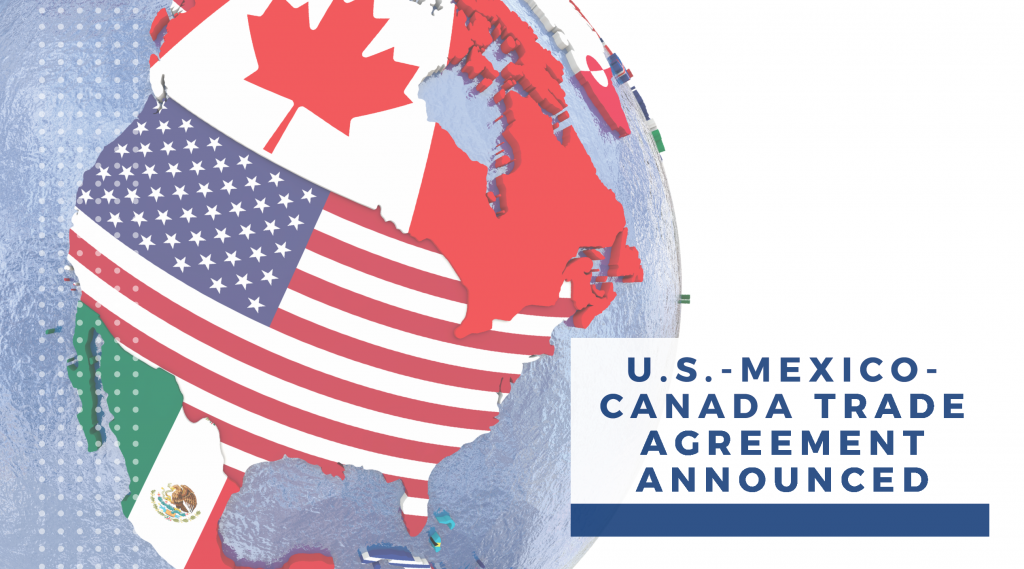The new United States-Mexico-Canada Agreement (USMCA) outlines terms of trade between the U.S. grains industry and two of its largest customers that would preserve duty-free access to those markets and offer improvements to the procedures necessary for the free flow of trade.
Negotiators from the United States, Mexico and Canada announced late Sunday they had concluded talks for a new, modernized trade agreement to replace the existing North American Free Trade Agreement (NAFTA).
In addition to keeping the favorable trade terms that helped build a deeply integrated and growing supply value chain for U.S. grains and livestock, the agreement adds positive measures related to rapid response for sanitary and phytosanitary (SPS) challenges, calls for increased transparency and science-based SPS measures in accordance international standards and specifically addresses agricultural biotechnology, including new breeding methods and gene editing.
“The U.S. Grains Council (USGC) is very pleased to see the United States, Mexico and Canada have reached a new agreement,” said USGC Chairman Jim Stitzlein said in a statement. “No trade agreement has had more impact on our sector than NAFTA which prompted explosive growth in our export sales to both countries as well as the development of a fully-integrated grains and livestock supply value chain within North America.”
NAFTA has been the most important trade agreement for U.S. agriculture and prompted development of the most successful trading bloc on the globe, benefiting the U.S. economy broadly. Over the past 20 years, U.S. agricultural exports to Canada and Mexico tripled and quintupled, respectively. One in every 10 acres on American farms is planted to feed hungry Canadian and Mexicans.
Mexico has imported more than 14 million metric tons (551 million bushels) of U.S. corn thus far in the 2017/2018 marketing year (Sept. 2017 to July 2018), already exceeding last marketing year’s record-setting total and maintaining the country’s rank as top buyer of U.S. corn. Mexico is also the largest importer of U.S. dried distiller’s grains with solubles (DDGS) this marketing year at 1.95 million tons, up 3.2 percent year-over-year. The country is also a critical buyer of U.S. barley, malt and sorghum.
Canada is a major ethanol and DDGS buyer. The country imports close to 20 percent of its domestic fuel ethanol, nearly all of it from the United States. As the second largest buyer of U.S. ethanol overall, Canada has imported nearly 307 million gallons (equivalent to 109 million bushels of corn) this marketing year. Canadian imports of U.S. DDGS have steadily increased since the 2014/2015 marketing year, with current marketing year imports of 605,000 tons.
“Over the past two decades, this agreement has proven beneficial for the producers, agricultural sectors and economies of all three countries.” Stitzlein said in the statement. “We appreciate the dedicated, hard work of our negotiating team to achieve this outcome with our neighbors and customers and look forward to fully examining the new text as the process of approving the new agreement begins a new phase.”
The International Trade Commission (ITC) will now review the agreement and issue a formal report on its economic impacts. Congress will also begin to examine the new text, which is likely to be signed in late November by the three countries. Then, their respective legislative bodies must approve the pact before it becomes law and enters into force.
Read more about the Council’s work related to the NAFTA modernization talks here.
About The U.S. Grains Council
The U.S. Grains Council develops export markets for U.S. barley, corn, sorghum and related products including distiller’s dried grains with solubles (DDGS) and ethanol. With full-time presence in 28 locations, the Council operates programs in more than 50 countries and the European Union. The Council believes exports are vital to global economic development and to U.S. agriculture’s profitability. Detailed information about the Council and its programs is online at www.grains.org.

